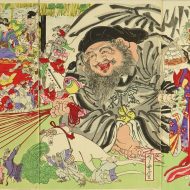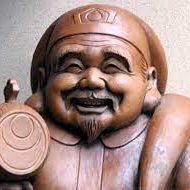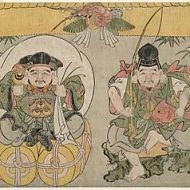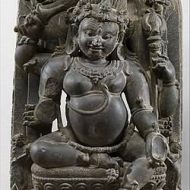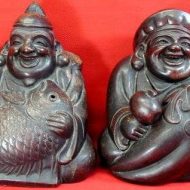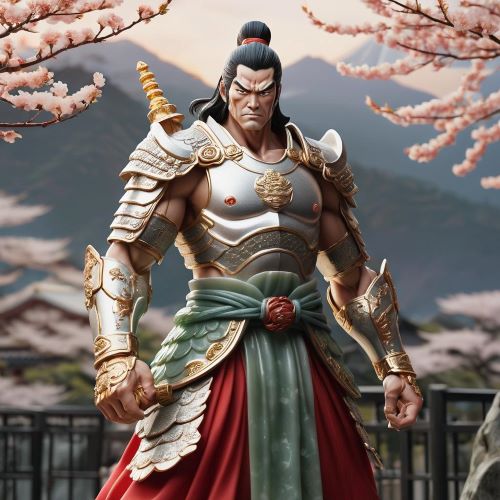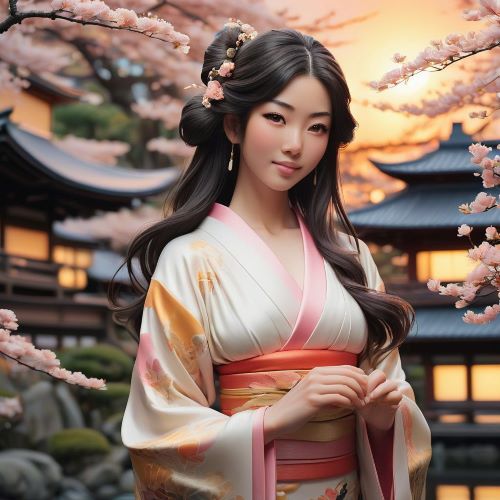Daikokuten : The God of Wealth
Listen
At a glance
| Description | |
|---|---|
| Origin | Japanese Mythology |
| Classification | Gods |
| Family Members | N/A |
| Region | Japan |
| Associated With | Wealth, Prosperity, Success |
Daikokuten
Introduction
In Japanese mythology, Daikokuten is regarded as the god of wealth and protection for farmers. In Japan, Daikokuten is regarded as one of the Seven Gods of Luck. He is a symbol of wealth, fertility, and abundance, and his image is commonly seen in shops all across the country. However, unlike the other gods of the Lucky Gods, Daikokuten was not originally from Japan. Instead, he was inspired by an Indian deity. At a glance, the relationship between the two is quite different. Daikoku is often associated with the Hindu god Mahkla, who went to Japan during the time when Buddhism and Hinduism were in their infancy.
Although Daikokuten is not related to a Buddhist deity, his origins are rooted in Japanese folk religion’s mix of foreign and native beliefs. By combining the concepts of Mahakala and Daikokuten, the Japanese were able to create a new deity. In addition, the pilgrims who go to the Mount Ontake in Japan wear a white scarf with the seed syllable of Mahakala. Stories often feature Daikokuten’s bold and rich appearance, but they also often feature his ability to provide other people with blessings and fortune. He role is often seen as interchangeable with the other Seven Gods.
Physical Traits
He is depicted as a stout, dark-skinned man who carries a bag full of treasures and a wish-granting tool in his right hand. He also has two rice bags on his back. In addition, rats are sometimes seen eating the rice. The concept of prosperity is additionally emphasized by the rats. In earlier versions, he resembled the Indian demons or Yakshas with an evil aura around him.
Daikokuten’s iconography started to change during the 14th century. During this period, he became known for being depicted as a man who is either sitting on a rice bale or holding a mallet. It is uncertain how the attribute originated, though it is believed that it was linked to the deity’s association with a group known as the Saptamatrkas. In the Madarijin ritual, the seven mothers are depicted holding a variety of objects, which are believed to represent their role in the wreaking of plague.
During the 16th century, the three main deities of the Muromachi period—the Daikokuten, Sarasvat-Benzaiten, and Vairavaa-Bishamonten—were combined into a single deity known as Sanmen Daikokuten. This new deity was able to connect the deity’s benign form with its less prominent wrathful one. This new form of depiction was introduced in later versions of the legend of Daikokuten’s appearance to the Saich in Mount Hiei. According to the legend, the god appeared to the monk with six arms and three faces in response to his request to provide daily nourishment for 3,000 monks.
Family
Being an adopted god of sorts in Japanese mythology, the history or family lineage is unclear.
Other Names
The deity is also referred to as the God of the Great Darkness, and he is depicted as a man who is seeking fortune. He has various forms, such as the Daikokunyo, which literally means “She of the Great Blackness,” or the Daikokutennyo, which literally means “She of the Great Black Heavens.” In Shinto, he is also often referred to as the mythological hero kuni-nushi. The name of this character, which is written in Chinese ideograms, is pronounced Daikoku.
Powers and Abilities
The powerful weapon wielded by Daikokuten is known as Uchide no Kozuchi, which literally means “The Power Over Fortune.” In many popular stories, this item can create anything that the person holding it desires. Because of his association with grains and plenty, he is also sometimes regarded as a fertility god. In addition, he is known for making an obscene gesture known as the “fig sign” which is meant to denote genetalia.
The practice of stealing of fortune, which is referred to as fukunusubi, involved the depiction of various gods and goddesses. In addition to Daikokuten’s statue, this practice also involved the discarding of other idols. Because of this, an end-of-year market near a major Buddhist temple in Tokyo was associated with the sale of these statues.
In order to make a quick buck from the theft, the thieves would sell the images they stole to the more traditional buyers. This practice is carried out mainly in small shops and restaurants. Like Ebisu, which is also a protective deity, Daikokuten is known to protect those who are trying to achieve success.
Modern Day Influence
There are many temples in modern Japan where Daikokuten is worshipped both as the primary deity and as the secondary deity. The Japanese believe that the god can bing good fortune and usually have a figurine or any other representation prominently placed at all places of business like the Nang Kwak of Thailand.
Related Images
Frequently Asked Questions
What is Daikokuten the god of?
Daikokuten, also known as Daikoku, is a Japanese deity of wealth, prosperity, and abundance, commonly associated with agriculture and trade. As one of the Seven Lucky Gods (Shichifukujin), he symbolizes good fortune. He is typically depicted as a jovial, stout figure carrying a bag of treasure and a mallet that grants wishes. Daikokuten’s origins trace back to the Indian god Mahākāla. He is especially revered during the New Year, representing hope for prosperity in the coming year.
How strong is Daikokuten?
Daikokuten’s strength is symbolic, representing wealth, prosperity, and good fortune. He wields a mallet that can produce riches and fulfill wishes, highlighting his transformative power. As a prominent figure among the Seven Lucky Gods, he significantly influences Japanese culture and societal values. Additionally, he is seen as a protector of households, promoting harmony and success. His strength lies in the blessings he bestows upon those who worship him.
Is Daikokuten the god of luck?
Yes, Daikokuten is considered a god of luck in Japanese mythology. He is primarily associated with wealth, prosperity, and abundance, which contributes to his reputation as a bringer of good fortune. As one of the Seven Lucky Gods (Shichifukujin), he embodies the ideals of luck and success, making him a popular figure among merchants and those seeking prosperity. His blessings are sought during celebrations, particularly the New Year, as people hope for luck and abundance in the coming year.
Is Daikokuten the god of darkness?
What are Daikoku's powers?

